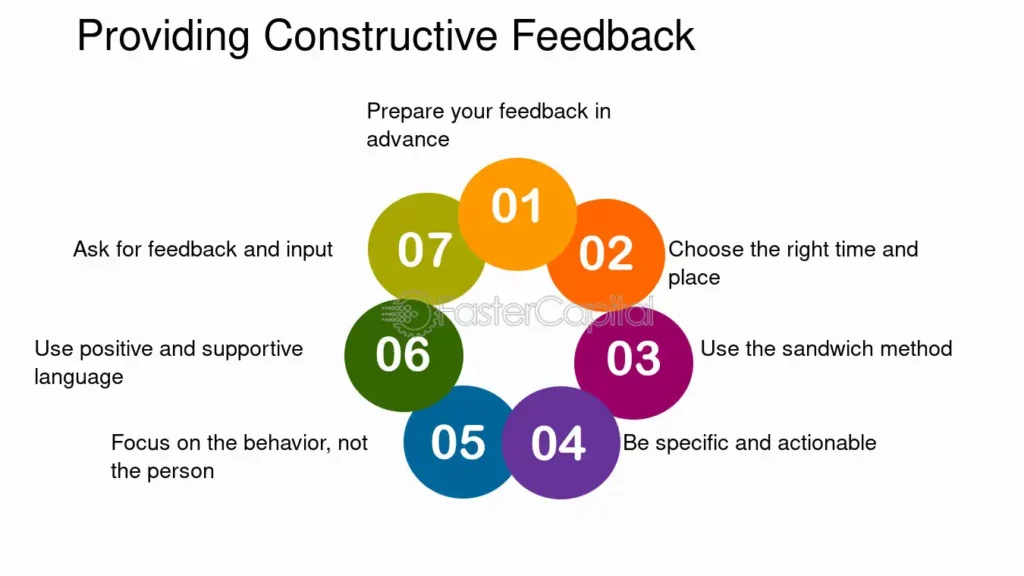Want to give your manager constructive feedback but worried they’ll take it the wrong way? Here are some of the best ways to approach giving feedback to your manager without sounding intimidating.
It might feel as though you’re walking a tightrope when it comes to sending feedback up to your manager. After all, you don’t want to be the person to criticize the individual who is managing your work. However, when you know how to provide feedback in the right way, it can help you create a better workplace, strengthen communication, and improve your relationship with your manager.
Whether it’s addressing areas that need improvement or offering praise for effective leadership, learning how to give thoughtful, well-timed feedback is a skill that can benefit both you and your manager.
Don’t let fear discourage you, especially when you have a suggestion or idea to improve efficiency and morale in your workplace.
In this guide, we will outline some best practices for delivering feedback to your manager in a manner that is respectful, actionable, and impactful.
Table of Contents
Why Is Giving Feedback to Your Manager Important?
No one understands a manager like their employees. Feedback allows employees to share their point of view on a manager’s performance in ways that promote their team’s success. Here’s a look at how giving feedback to managers helps streamline their overall team’s performance.
Identify Areas of Improvement
The intention of feedback is to support individual and professional growth. When an employee is able to discuss development areas with their manager, it can help managers identify weaknesses or areas of opportunity that they may not know about. Once these areas for development have been identified, a manager can work to address them, making them better leaders.
Help Managers Become Better Leaders
Managers receiving feedback from different people on the team can make them aware of what type of leader their team needs. Some people need a more hands-on manager, while others prefer to work independently, and the manager can adapt their style, as needed.
Support Employee Career
A good manager can help accelerate their employees’ careers. They can advocate for their direct reports, increase visibility on their work, and get them on projects they care about. When you give feedback to your manager on a regular basis and receive feedback from them, this will make them support you personally and professionally over the course of your career.
Improve Team Performance
When employees feel supported and valued by their leader, they are generally more engaged and productive. Also, knowing their manager has their back can even boost retention.

Best Ways to Provide Feedback to Your Manager
Here are some of the best ways to offer feedback to your manager:
Ask for Assistance
Employees must feel comfortable informing their manager(s) if/when they require additional guidance. For example, you may need more guidance with a project, yet both you and your manager dislike excessive supervision.
Here’s an example of feedback:
“I know you’re busy, but it would help me very much to have more frequent check-ins with you, regardless of the project I have. That way I would know I am on the right path. I would understand better what you are looking for with deliverables-what is expected going forward so that I’ll be able to continue independently.”
Such informal feedback will let your manager know that you require additional support.
Appropriate Environment for Feedback
With upward feedback, particularly constructive feedback, consider when and where you have the discussion with your manager. If you are on a video conference call in a noisy café and need to shout over the espresso machine, it would probably be better to find a better time and place to provide feedback.
Providing constructive feedback to your manager is most effective in a one-on-one meeting, so a department or client meeting isn’t your best option. Choosing an appropriate time and place to provide feedback, like a private meeting, increases the chances of your feedback being heard and your manager receiving it positively.
Give “Constructive” Feedback
The name itself is a clue! Constructive feedback should be supportive and help lead to a positive outcome or behavior change. That doesn’t mean you can’t give negative feedback, but all feedback is generally better received when you focus on solutions rather than complaints.
Here’s an example of feedback:
Instead of saying, “You never listen in team meetings,” try saying, “This is the second time I’ve noticed that it seems like my input is not fully considered in the meetings. Perhaps we can allow for more opportunities for discussion —it might lead to even better team decisions.”
This approach emphasizes collaboration and improvement, rather than blame.

Use Questions to Guide Feedback
Questions are a great way to provide feedback to your manager in a collaborative and non-confrontational way. Asking a question encourages dialogue and shows that you want to understand your manager’s perspective rather than be defensive.
Don’t forget that questions are also a tactic in many negotiations. So make sure your tone and wording don’t sound condescending or too vague.
Here is an example:
Instead of saying, “You don’t give good direction,” ask, “Would it help if we were clear about priorities at our weekly meeting?”
This invites a kind of collaboration and nudges the interaction toward improvement without taking an obvious stance away from your manager’s direction.
Focus on the Future-Thinking
In order to keep your feedback solution-based, shift conversation to the future, which means “what could be done next.” This method is also known as “feedforward” and promotes growth based on positive actions rather than dwelling on past mistakes.
Here is an example:
Instead of saying, “You didn’t give me enough context in the last meeting,” try saying, “In the next meeting, it would be really helpful if you could provide at least a bit more context in the beginning; it helps me participate in the discussion more!”
Shifting to future thinking indicates that you want to invest in working better together, and it isn’t just to point out a flaw. Future thinking also sets a more collaborative tone. A future-thinking suggestion opens up dialogue for mutual respect.
Keep it to the Point
Getting straight to the point helps to minimize confusion, reduces unwanted tension, and shows you have confidence in your viewpoint. When people explain too deeply or engage in too much small talk, it can lead to an awkward situation and cause the conversation to drift from its purpose.
As an example:
Instead of saying, “I’ve been meaning to talk to you about something that’s been on my mind a lot lately and I wasn’t quite sure how to bring it up…” Try saying, “I want to share some feedback from yesterday’s team meeting—I think a couple of us did not feel like we had space to contribute.”
Balancing Positive Feedback
Even though the traditional “compliment sandwich” is often thought of as cliché, providing good feedback with the critique can create plenty of rapport when the feedback is authentic. You do not need to cover up every critique with praise, but providing a positive observation can set a collaborative tone and build the recipient’s receptiveness.
As an example:
“I truly appreciate your support in the past with the team’s effort to meet our tight deadlines. While I value your support, I think we have a lot of room for improvement in how we manage last-minute changes… maybe a quick review will provide the necessary clarity for next time?”
Thrive with Feedback
Providing feedback to your manager can be daunting, but if you’re honest and open, it could lead to significant development for both of you. Clarity, solutions, and mutual respect are essential in addressing feedback and establishing an avenue for better communication, collaboration, and overall workplace health. Constructive feedback is not just about sharing what isn’t right. True constructive feedback is about building something better together.
Ready to strengthen the feedback culture in your organization? Partner with EvolveDash, a software solution company that helps create real-time feedback tools. Let’s turn conversations into catalysts for growth. 👉 Explore how EvolveDash can help
FAQs
- Is it okay to give feedback to my manager?
Yes, as long as it’s constructive and respectful. Managers often appreciate honest insights that help improve team dynamics or performance, especially when delivered thoughtfully.
- How do I give negative feedback without sounding rude?
Focus on solutions instead of complaints. Use “I” statements, frame feedback around future improvements, and keep your tone calm and professional.
- What’s the best time to give feedback?
Ideally, schedule a private one-on-one meeting or bring it up during performance reviews or feedback sessions—never during high-stress moments or in front of others.
- Should I include positive feedback too?
Absolutely. Leading with genuine praise creates a balanced tone and makes the constructive feedback easier to accept and act upon.


















